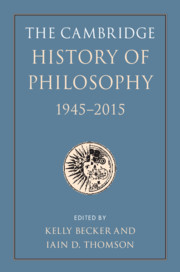Book contents
- The Cambridge History of Philosophy, 1945–2015
- The Cambridge History of Philosophy, 1945–2015
- Copyright page
- Contents
- Contributors
- Preface and Acknowledgments
- Introduction
- Part I Analytic Philosophy
- Section One Language, Mind, Epistemology
- 1 Analytic Philosophy of Language
- 2 Analyticity
- 3 Philosophy of Linguistics
- 4 Varieties of Externalism, Linguistic and Mental
- 5 An Analytic-Hermeneutic History of Consciousness
- 6 Computational Philosophies of Mind
- 7 Philosophy of Action
- 8 Contemporary Responses to Radical Skepticism
- 9 Post-Gettier Epistemology
- Section Two Logic, Metaphysics, Science
- Section Three Analytic Moral, Social, and Political Philosophy
- Section Four Analytic Aesthetics and Philosophy of Religion
- Part II Continental Philosophy
- Part III Bridge Builders, Border Crossers, Synthesizers, and Comparative Philosophy
- Part IV Epilogue: On the Philosophy of the History of Philosophy
- References
- Index
1 - Analytic Philosophy of Language
From First Philosophy to Foundations of Linguistic Science
from Section One - Language, Mind, Epistemology
Published online by Cambridge University Press: 08 November 2019
- The Cambridge History of Philosophy, 1945–2015
- The Cambridge History of Philosophy, 1945–2015
- Copyright page
- Contents
- Contributors
- Preface and Acknowledgments
- Introduction
- Part I Analytic Philosophy
- Section One Language, Mind, Epistemology
- 1 Analytic Philosophy of Language
- 2 Analyticity
- 3 Philosophy of Linguistics
- 4 Varieties of Externalism, Linguistic and Mental
- 5 An Analytic-Hermeneutic History of Consciousness
- 6 Computational Philosophies of Mind
- 7 Philosophy of Action
- 8 Contemporary Responses to Radical Skepticism
- 9 Post-Gettier Epistemology
- Section Two Logic, Metaphysics, Science
- Section Three Analytic Moral, Social, and Political Philosophy
- Section Four Analytic Aesthetics and Philosophy of Religion
- Part II Continental Philosophy
- Part III Bridge Builders, Border Crossers, Synthesizers, and Comparative Philosophy
- Part IV Epilogue: On the Philosophy of the History of Philosophy
- References
- Index
Summary
In 1945, the turn to logic and language that initiated the analytic tradition in philosophy was sixty-six years old. The tradition was founded in 1879 when Gottlob Frege invented the predicate calculus as a necessary prerequisite to his goal of deriving all mathematics (except geometry) from logical axioms and definitions of mathematical concepts. His aim – to identify what numbers are and explain our knowledge of them – fit what he, Bertrand Russell, and G. E. Moore then took to be the main tasks of philosophy – to give a general description of reality, to explain what, and how, we know about it, and to discern moral facts capable of guiding action.1 One part of reality, numbers, were, for Frege, whatever they had to be to explain our arithmetical knowledge. His explanation was based on taking natural numbers to be sets of concepts the extensions of which can exhaustively be paired off, without remainder. Related definitions of arithmetical notions allowed him to derive the axioms of Peano Arithmetic from what he took to be self-evident logical axioms, without which thought might prove impossible. In this way, he thought, he could reduce arithmetical knowledge to logical knowledge.
- Type
- Chapter
- Information
- The Cambridge History of Philosophy, 1945–2015 , pp. 17 - 31Publisher: Cambridge University PressPrint publication year: 2019
- 1
- Cited by



